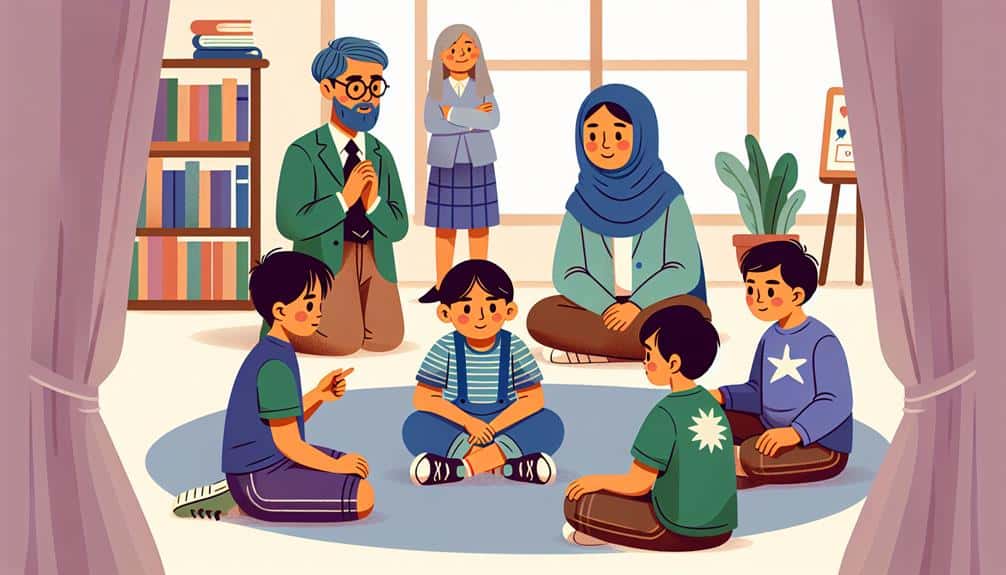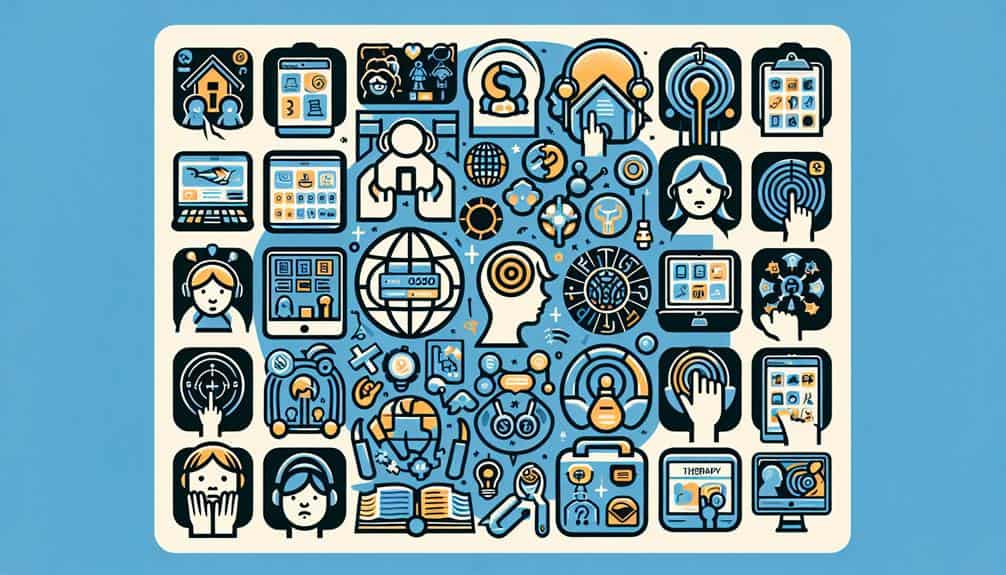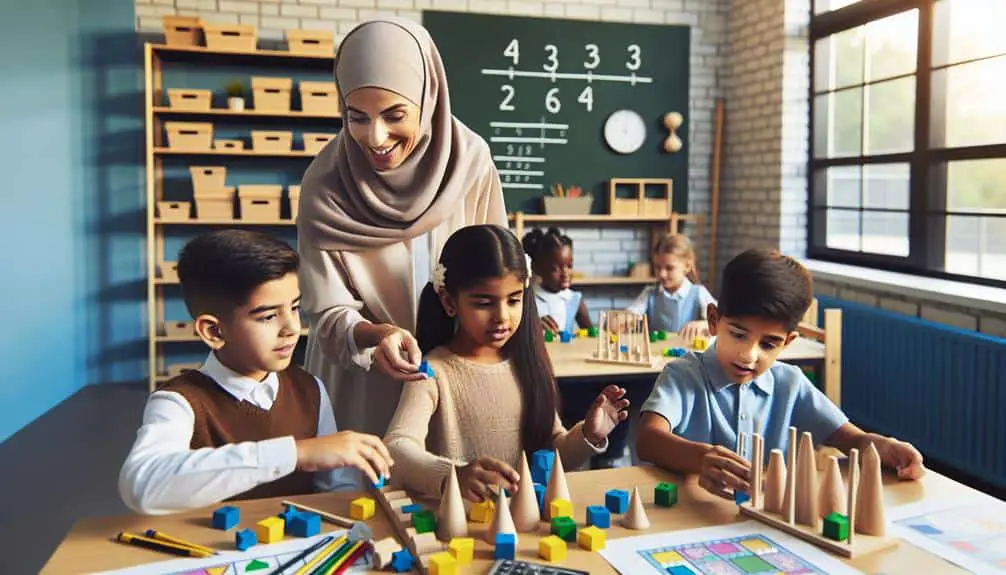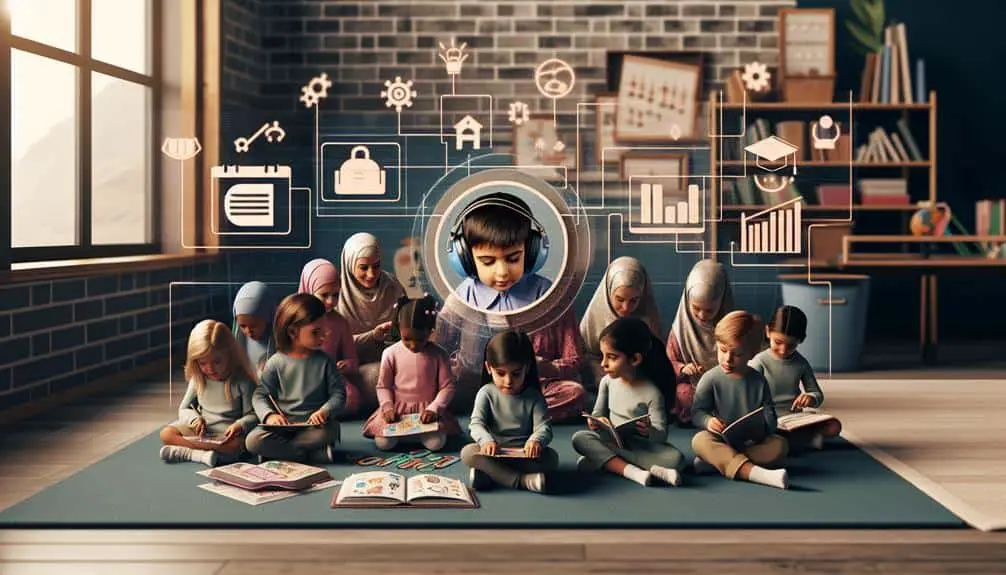To teach social skills to special needs homeschoolers, start by understanding their sensory needs and social anxieties. Tailor lessons to their strengths with personalized activities and visual aids. Use improv games, art projects, and outdoor adventures to enhance communication. Create structured settings like playdates and social skills groups. Encourage positive interactions through reinforcement and peer support. By taking a compassionate and individualized approach, you can help them thrive socially.Explore more strategies to support their unique needs.
Key Points
- Individualized lesson plans tailored to strengths and interests.
- Incorporate visual aids and tools for better understanding.
- Engage in customized social activities to promote interaction.
- Utilize improv games and drama exercises for skill development.
- Create structured social settings for practical application and reinforcement.
Understanding Special Needs Homeschoolers
Understanding special needs homeschoolers requires a compassionate and informed approach to meet their unique educational and social needs. When it comes to homeschooling children with special needs, addressing sensory needs is vital. Sensory needs vary greatly among individuals, so it's important to create a learning environment that accommodates these differences.
Some children may be sensitive to loud noises, bright lights, or certain textures. By understanding and adapting to these sensory needs, you can create a more comfortable and conducive learning environment for your child.
Additionally, social anxiety is a common challenge for special needs homeschoolers. It's important to approach social interactions with patience and understanding. Encouraging socialization in a safe and supportive environment can help your child build confidence and overcome social anxiety.
Providing opportunities for social interactions at your child's own pace can make a significant difference in their social development. Remember, progress may be gradual, but with consistent support and encouragement, your child can learn to navigate social situations with greater ease.
Tailoring Social Skills Curriculum
When tailoring a social skills curriculum for special needs homeschoolers, consider creating individualized lesson plans that cater to their unique strengths and challenges.
Customized social activities can also play an important role in helping them practice and improve their social interactions in a comfortable setting.
Individualized Lesson Plans
To tailor the social skills curriculum effectively for special needs homeschoolers, consider creating individualized lesson plans that cater to their unique needs and learning styles. Personalized approaches and interactive learning can greatly enhance their understanding and retention of social skills.
Here are some tips on how to create individualized lesson plans for special needs homeschoolers:
- Customized Strategies: Develop strategies that align with the individual's strengths and interests to make learning more engaging.
- Hands-On Activities: Incorporate hands-on activities such as role-playing, arts and crafts, or sensory play to promote active participation and skill development.
- Visual Supports: Utilize visual aids like social stories, picture schedules, or cue cards to help individuals with different learning preferences grasp social concepts effectively.
- Flexible Scheduling: Allow for flexibility in lesson timing and duration to accommodate variations in attention spans and energy levels.
Customized Social Activities
For special needs homeschoolers, tailoring the social skills curriculum through customized social activities is key to fostering meaningful interactions and skill development.
Outdoor adventures can be a fantastic way to encourage teamwork, communication, and problem-solving. Consider organizing nature walks, picnics, or visits to local parks where your child can engage with peers in a relaxed setting. These activities provide opportunities for practicing social skills in a natural environment while enjoying the benefits of fresh air and physical activity.
Art projects are another excellent avenue for promoting socialization and creativity. Collaborative arts and crafts sessions can help children learn to share materials, take turns, and express themselves through various mediums. Painting, sculpting, or crafting together can enhance communication skills and build a sense of camaraderie among participants. Additionally, art projects allow for individual expression within a group setting, encouraging children to appreciate each other's unique perspectives.
Utilizing Visual Aids and Tools
You can enhance your special needs homeschooler's social skills by incorporating visual aids and tools into their learning.
Visual schedules can help establish routines, social stories can guide appropriate behaviors, and communication boards can facilitate interaction.
These tools provide structure, support, and clarity, aiding in your child's understanding and engagement in social interactions.
Visual Schedules for Routines
Consider incorporating visual schedules into your daily routines to provide clear structure and support for special needs homeschoolers. Visual schedules can be powerful tools in helping individuals with special needs navigate their day more independently.
Here are some tips to effectively implement visual schedules:
- Create Visual Schedule: Use pictures, symbols, or words to outline the daily routine.
- Consistency: Keep the visual schedule in a consistent location for easy reference.
- Break Tasks Down: Divide tasks into smaller steps to make them more manageable.
- Use Timers: Pair visual schedules with timers to help with moving between activities.
Visual schedules not only aid in routine organization but also promote independence and reduce anxiety by offering predictability. By introducing visual schedules into your homeschooling environment, you're providing a valuable resource that can enhance the learning experience for special needs individuals.
Experiment with different visual aids to find what works best for your child, and remember to be patient as they adapt to this new tool.
Social Stories for Behavior
Implementing social stories with visual aids and tools can be a beneficial strategy for teaching and reinforcing positive behaviors in special needs homeschoolers. Social stories are short narratives that describe social situations and appropriate responses, aiding in behavior management by providing clear examples of expected behaviors. By incorporating social scripts and behavior modeling into these stories, you can effectively teach your special needs homeschooler how to navigate social interactions and respond appropriately.
Storytelling is a powerful tool that allows individuals to understand complex social cues in a structured and engaging manner. Through social stories, you can break down social norms into manageable parts and present them in a way that's accessible and relatable for your child.
Utilizing visual aids such as pictures, icons, or symbols alongside these stories can enhance comprehension and retention, reinforcing the desired behaviors. By combining storytelling with visual supports, you create a holistic approach to behavior management that promotes understanding and encourages positive social interactions.
Communication Boards for Interaction
To further support your special needs homeschooler in developing social skills, utilizing communication boards with visual aids and tools can enhance their interaction abilities. These boards can be powerful tools to facilitate communication and understanding in various social situations.
Here are some ways you can make the most of communication boards for interaction:
- Interactive games: Incorporate interactive games on the communication board to make learning social skills engaging and fun.
- Communication devices: Introduce communication devices alongside the board to encourage verbal and nonverbal communication.
- Social cues: Use the board to teach your child about different social cues and how to appropriately respond to them.
- Nonverbal cues: Include symbols or images on the board to help your child understand and interpret nonverbal cues during interactions.
Incorporating Role-Playing Activities
Integrating role-playing activities into your special needs homeschool curriculum can be an effective way to teach and reinforce social skills in a practical and engaging manner.
Improv games and drama exercises offer a hands-on approach that allows your child to practice real-life social interactions in a safe and supportive environment. Improv games provide a fun way for your child to work on spontaneity, listening skills, and collaboration. Encourage them to imagine different scenarios and act them out, promoting creativity and flexibility in social situations.
Drama exercises, on the other hand, can help your child understand emotions, body language, and tone of voice, essential aspects of effective communication. When incorporating role-playing activities, start with simple scenarios and gradually increase the complexity as your child becomes more comfortable.
Provide positive reinforcement and constructive feedback to enhance their learning experience. Remember, the goal isn't perfection but progress. By engaging in these activities regularly, your child can develop confidence and proficiency in various social skills.
Creating Structured Social Settings
When guiding your special needs homeschooler in developing social skills, consider creating structured social settings to provide them with opportunities for practice and growth in real-life interactions. These settings can help your child navigate group dynamics and understand social cues better.
Here are some strategies to assist you:
- Structured Playdates: Organize playdates with peers where activities are planned and roles are defined, helping your child learn about peer interactions.
- Social Skills Groups: Enroll your child in social skills groups or classes specifically tailored to teach them about social boundaries and appropriate behavior in different situations.
- Structured Outings: Plan outings to places like parks, museums, or community events with a clear agenda to introduce your child to various social settings and interactions.
- Role-Playing Scenarios: Create scenarios at home where your child can practice responding to social cues and understanding the dynamics of different social situations.
Encouraging Positive Social Interactions
Encouraging positive social interactions with your special needs homeschooler involves consistently reinforcing and praising their efforts to connect with others. Peer support can play an important role in this process. Encourage your child to interact with peers who demonstrate kindness and patience.
Positive reinforcement is key; celebrate even small steps towards social interaction. When your child makes an effort to engage with others, provide specific praise to highlight their achievement. For instance, if they initiate a conversation or share a toy, acknowledge their action and express pride in their attempt.
Create opportunities for social interactions in a controlled setting where your child feels comfortable. Practice social scenarios through role-playing and offer guidance on appropriate behaviors. Additionally, consider incorporating activities that promote teamwork and collaboration to foster positive social experiences.
Frequently Asked Questions
How Can I Handle Social Skills Setbacks or Regression in Special Needs Homeschoolers?
Facing setbacks or regression in social skills is tough. Remember, behavior management and social stories are powerful tools. Use role playing to practice interactions and encourage peer engagement. Stay patient and resourceful; progress takes time.
What Are Some Effective Ways to Teach Social Skills in Non-Verbal Special Needs Children?
To help non-verbal special needs children with social skills, try using sensory activities to engage them. Include peer interactions to practice communication. Utilize social stories to teach social cues and emotional awareness. Be patient and encouraging throughout the process.
Are There Specific Social Skills Programs or Resources Tailored for Homeschooling?
When it comes to homeschooling and social skills, there are plenty of tailored resources available. You can explore social skills activities and online resources for homeschool support and community involvement. Keep an eye out!
How Can I Address Social Skills Challenges Specific to High-Functioning Special Needs Children?
To address social skills challenges in high-functioning special needs children, focus on peer interactions and communication skills. Help them understand social cues and practice emotional regulation. Encourage patience and provide guidance to navigate social situations with confidence.
What Are Some Strategies for Promoting Social Skills Growth in Adolescents With Special Needs?
You can boost social skills growth in adolescents with special needs by engaging in role-playing activities and encouraging peer interactions. Social skills groups and community involvement offer valuable opportunities for learning and growth.



